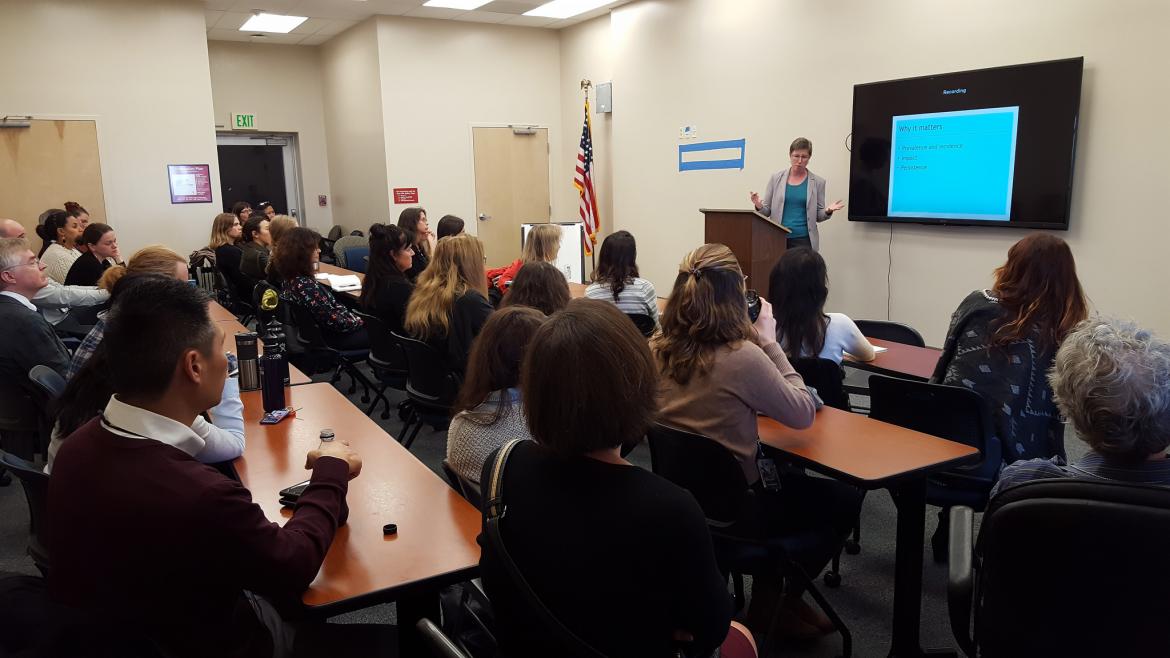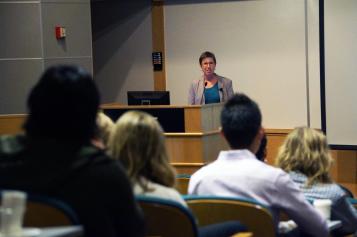By Nicholas Roznovsky

Mills College president Elizabeth L. Hillman, PhD, JD, speaks to department members at the San Francisco VA Medical Center about the scope and impact of sexual assault in the U.S. military. [Photo: Christina Mantel/UCSF Psychiatry]
Noted military justice expert and scholar Elizabeth L. Hillman, PhD, JD, MA, spoke to UCSF Psychiatry faculty and trainees about the pervasive nature of sexual harassment in science, technology, and engineering, particularly in the fields of medical training and education during the 13th annual Dr. Evelyn Lee Visiting Scholar Lecture in Cultural Competency and Diversity on Tuesday, November 7, 2017.
"This isn't really new," Hillman told the audience, referring to sexual harassment in the scientific workplace. "Maybe the most staggering thing about this is that Title IX is more than 40 years old... Sexual harassment has been illegal for decades and we've seen very little change in the prevalence and incidence rates."
And while the damage to professional careers and personal lives caused by sexual harassment is deep, the issue is also having a profound impact on future of medicine. "We're losing a tremendous amount of talent and causing a lot of collateral damage," Hillman noted. "Even if you don't care about the collateral damage in people's lives, if you care about the advancement of science and of medicine, then you should care that people aren't able to succeed based on their capactiy to contribute because of this really pervasive problem."
Following her Grand Rounds talk on the Parnassus, Hillman visited Zuckerberg San Francisco General Hospital and Trauma Center for an hour-long discussion about the current legal structures which aim to prevent sexual harassment. Later that afternoon, she spoke at the San Francisco VA Medical Center on the issue of sexual assault in the U.S. military.
Named the 14th president of Mills College in July 2016, Hillman’s academic background span the arts and sciences, engineering, and the law. She received her bachelor of science in electrical engineering from Duke University in 1989 and an MA in history from the University of Pennsylvania in 1994, and went on to receive a JD from Yale Law School in 2000 and a PhD in history with a focus on women’s history from Yale University in 2001.
Hillman holds extensive experience in higher education administration and instruction and a distinguished background working on key women and gender issues. She is the former provost and academic dean at the UC Hastings College of the Law, where she also served as the chief academic officer.
Prior to her position at UC Hastings, Hillman served as professor of law and director of faculty development at Rutgers University School of Law, and taught at Yale University and the US Air Force Academy. She also was an officer in the U.S. Air Force, where she served as a space operations officer and orbital analyst. She has received numerous awards and honors for her teaching, scholarly excellence, and service.
Hillman has had a longstanding academic interest in women’s education, and expertise in military gender issues that has brought her national and international recognition. Her master’s thesis focused on the design of 1970s women’s uniforms in the national service academies. Her PhD dissertation addressed assumptions about race, gender, and sexuality by the U.S. armed forces in the prosecution of military crimes.

Hillman told the audience that sexual harassment in the STEM education environment is both widespread and rarely reported. Decades of studies have concluded that "about 60 percent of trainees in medical education experience some form of sexual harassment." [Photo: Nicholas Roznovsky/UCSF Psychiatry]
She has conducted extensive research on the history of sexual violence in military organizations and culture, which led to a yearlong appointment in 2013 to the Response Systems to the Adult Sexual Assault Crimes Panel (RSP), an independent panel chartered by the U.S. Congress to study and make recommendations about sexual assault in the U.S. military. Hillman went on to chair the RSP’s Comparative Systems Subcommittee, leading the preparation and drafting of a comprehensive report recommending significant changes to improve military responses to sexual assault. She has testified as an expert witness on several occasions before Congressional committees and other venues.
Hillman has authored books, book chapters, and journal articles, and was the principal researcher and author of a comparative study of national military responses to sexual assault, commissioned by the United Nations Office of the High Commissioner for Human Rights. She is a director and past president of the National Institute of Military Justice (NIMJ), a nonprofit dedicated to promoting fairness in and public understanding of military justice worldwide, and sits on the editorial boards of Gender and Conflict and Critical Military Studies.
At UC Hastings, Hillman demonstrated expertise in curricular reform, enrollment management, financial aid, student services, strategic planning, faculty governance, board relations, development, and technology. She led initiatives to improve operations and provide outreach and community-building programs for prospective and current students to improve retention efforts. She oversaw an annual budget of approximately $60 million.
With a passion for women-centered education, Hillman sees a liberal arts education as creating the potential for growth, understanding, and progress, and has an innate understanding of how to unite passionate people around a mission. Her choices in her educational, scholarship, advocacy, and professional endeavors have uniquely prepared Hillman for her leadership position at Mills.
Lecture series honors former faculty member and champion of diversity
The annual Dr. Evelyn Lee Visiting Scholar Lecture in Cultural Competency and Diversity is sponsored by the UCSF Department of Psychiatry Diversity Committee in remembrance of Evelyn Lee, EdD, who served as a clinical faculty member for more than twenty years before her passing in 2003. In 1982, she joined UCSF and the Asian Focus Psychiatric Inpatient Unit at San Francisco General Hospital (SFGH) as its program director, rising to the rank of clinical professor in 1999.
In addition to her work at UCSF and SFGH, Lee served as executive director of San Francisco-area mental health agency Richmond Area Multi-Services and authored more than 30 publications fostering cultural competence and cross-cultural communication in mental health. In 1988, she founded the first-ever Chinese Family Alliance of Mentally Ill, and four years later helped organize the NICOS Chinese Health Coalition, both in San Francisco.
Previous lectureship recipients include Helena Hansen, MD, PhD; Francis G. Lu, MD; Richard F. Mollica, MD, MAR; Elyn R. Saks, PhD, JD; and Lonnie Snowden, PhD.
About UCSF Psychiatry
The UCSF Department of Psychiatry and the Langley Porter Psychiatric Institute are among the nation's foremost resources in the fields of child, adolescent, adult, and geriatric mental health. Together they constitute one of the largest departments in the UCSF School of Medicine and the UCSF Weill Institute for Neurosciences, with a mission focused on research (basic, translational, clinical), teaching, patient care and public service.
UCSF Psychiatry conducts its clinical, educational and research efforts at a variety of locations in Northern California, including UCSF campuses at Parnassus Heights, Mission Bay and Laurel Heights, UCSF Medical Center, UCSF Benioff Children's Hospitals, Zuckerberg San Francisco General Hospital and Trauma Center, the San Francisco VA Health Care System and UCSF Fresno.
About the UCSF Weill Institute for Neurosciences
The UCSF Weill Institute for Neurosciences, established by the extraordinary generosity of Joan and Sanford I. "Sandy" Weill, brings together world-class researchers with top-ranked physicians to solve some of the most complex challenges in the human brain.
The UCSF Weill Institute leverages UCSF’s unrivaled bench-to-bedside excellence in the neurosciences. It unites three UCSF departments—Neurology, Psychiatry, and Neurological Surgery—that are highly esteemed for both patient care and research, as well as the Neuroscience Graduate Program, a cross-disciplinary alliance of nearly 100 UCSF faculty members from 15 basic-science departments, as well as the UCSF Institute for Neurodegenerative Diseases, a multidisciplinary research center focused on finding effective treatments for Alzheimer’s disease, frontotemporal dementia, Parkinson’s disease, and other neurodegenerative disorders.
About UCSF
UC San Francisco (UCSF) is a leading university dedicated to promoting health worldwide through advanced biomedical research, graduate-level education in the life sciences and health professions, and excellence in patient care. It includes top-ranked graduate schools of dentistry, medicine, nursing and pharmacy; a graduate division with nationally renowned programs in basic, biomedical, translational and population sciences; and a preeminent biomedical research enterprise. It also includes UCSF Health, which comprises top-ranked hospitals – UCSF Medical Center and UCSF Benioff Children’s Hospitals in San Francisco and Oakland – and other partner and affiliated hospitals and healthcare providers throughout the Bay Area.





